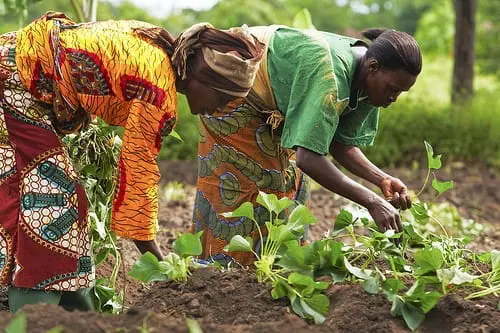
Ghana’s peasant farmers are sounding alarm bells over escalating contamination from illegal mining operations that could force the nation’s already massive annual food import expenditure beyond $3.5 billion, threatening agricultural livelihoods and consumer health across West Africa’s second-largest economy.
A comprehensive year-long investigation by Pure Earth and the Environmental Protection Agency (EPA) has documented dangerous levels of mercury, arsenic, lead, and heavy metals infiltrating soil, water sources, fish populations, and food crops across six mining-affected regions, creating unprecedented risks for both food production and public consumption.
Ghana spent over $3.5 billion on food imports in 2023 according to Statista, already straining foreign exchange reserves while local agricultural production faces mounting environmental pressures from the country’s expanding illegal mining epidemic known locally as “galamsey.”
Bismark Nortey, Executive Director of the Peasant Farmers Association of Ghana, emphasized the critical implications for national food security and economic stability. The organization represents thousands of smallholder farmers whose operations increasingly face contamination challenges from mercury-based gold extraction processes.
“Government agencies must treat this report as essential guidance for protecting agricultural producers,” Nortey stated. “Consumer confidence in locally produced food continues declining due to contamination concerns, potentially driving import costs even higher.”
The Pure Earth-EPA study, conducted between August 2024 and September 2025, revealed alarming pollution levels across artisanal and small-scale gold mining zones in Ashanti, Eastern, Central, Western, Western North, and Savannah regions. The Mercury Impact Assessment Study Project, funded by the UK government through The Evident Fund, aimed to develop actionable solutions for communities affected by mining pollution.
Critical contamination readings include soil mercury concentrations reaching 1,342 parts per million at Konongo Zongo in Ashanti Region, exceeding safe limits by over 13,000 percent. Airborne mercury measurements at Wassa Kayianko in Western Region peaked at 150 micrograms per cubic meter, surpassing Ghana’s permissible levels by 15,000 percent.
Arsenic contamination presents equally severe threats, with soil samples from Konongo Zongo recording 10,060 ppm, representing 4,000 percent above safety thresholds. Water sources at Konongo Odumase showed arsenic levels of 3.3 milligrams per liter, far exceeding drinking water standards established by international health organizations.
Lead concentrations in fish from Akwaboso in Central Region and Konongo Zongo measured 2.8 milligrams per kilogram, while pumpkin leaves in Western North contained 3.1 mg/kg, both exceeding World Health Organization safety guidelines for human consumption.
Essential food staples including kontomire, tomatoes, cereals, legumes, and tubers tested positive for mercury, arsenic, and lead contamination, with several samples recording levels well above international food safety standards. The widespread contamination confirms heavy metals are systematically entering Ghana’s agricultural food chain.
Illegal miners use toxic chemicals such as mercury and cyanide to separate gold from ore, with chemicals flowing into rivers that hundreds of communities depend on for drinking and domestic use, according to recent investigations into Ghana’s mining crisis.
A 2025 study highlighted that exposure to chemicals used in galamsey is linked to decreased sperm count and motility in men, and hormonal imbalances and increased chances of miscarriage in women, demonstrating the broader health implications beyond agricultural contamination.
Chronic exposure to mercury, arsenic, and lead has been scientifically linked to nervous system damage, kidney failure, developmental impairment in children, and various long-term health complications. The contamination patterns suggest systematic environmental degradation affecting both rural farming communities and urban consumers.
Agricultural experts warn that continued farmland and water source contamination will force producers to reduce operations or abandon cultivation entirely, accelerating Ghana’s dependence on imported food products. This dependency exposes consumers to global price volatility, as demonstrated during the 2022-2023 food inflation crisis that disproportionately affected African economies.
Ghana’s overall food imports hit $3.25 billion in 2024, with continued growth projected for 2025 as domestic production faces environmental challenges. The Minister of Food and Agriculture describes the growing dependence on imported food as a challenge while local production remains underdeveloped despite abundant agricultural resources.
Research teams propose urgent multi-sectoral interventions including pilot remediation projects in severely affected areas like Konongo Zongo, utilizing cost-effective technologies such as phytoremediation for soil restoration. Recommendations include strengthened enforcement of mining regulations, expanded clean water infrastructure investment, and comprehensive testing protocols for agricultural produce.
The burning of mercury amalgam to extract gold releases toxic fumes into the air, posing respiratory health risks to nearby communities with prolonged exposure leading to chronic respiratory diseases, compounding the agricultural contamination crisis.
The contamination crisis threatens Ghana’s agricultural sector, which employs approximately 52 percent of the national workforce and contributes significantly to gross domestic product. Environmental degradation from illegal mining operations undermines government efforts to achieve food self-sufficiency and reduce import dependency.
Nortey emphasized the economic implications of continued environmental degradation: “We cannot watch our soils and water sources become poisoned while spending billions importing food products we could produce safely domestically.”
The study’s findings highlight urgent need for coordinated government action to protect agricultural lands from mining contamination while developing sustainable remediation strategies for affected communities across Ghana’s gold-producing regions.



